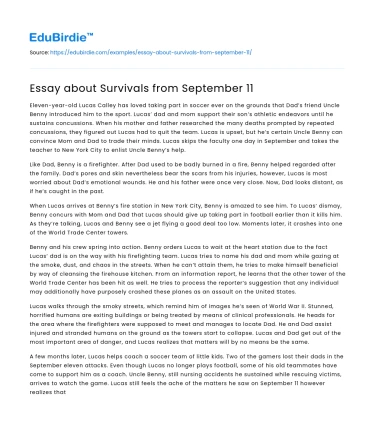Introduction
The September 11, 2001, attacks remain a significant event in global history, marking a day of profound tragedy and loss. Yet, amidst the devastation, stories of survival and resilience emerged, offering a glimpse into the human spirit's capacity to endure and recover. These accounts not only highlight individual and collective strength but also provide insights into psychological and social dynamics that facilitate recovery from traumatic events. Understanding the experiences of 9/11 survivors is essential not only for historical documentation but also for informing current and future support mechanisms for trauma victims. This essay delves into the multifaceted experiences of survivors from September 11, examining the immediate aftermath, psychological impacts, and long-term coping strategies that have been employed. By exploring these dimensions, the essay aims to contribute to the broader discourse on trauma recovery and resilience.
Immediate Aftermath: Chaos and Heroism
The immediate aftermath of the September 11 attacks was characterized by chaos, confusion, and a desperate struggle for survival. Individuals who were present at the World Trade Center and surrounding areas faced life-or-death decisions amid crumbling structures and pervasive fear. Survivors recount moments of sheer terror interspersed with acts of remarkable heroism. For instance, the actions of Rick Rescorla, the head of security for Morgan Stanley, exemplify the bravery displayed by many on that day. Rescorla is credited with saving over 2,700 lives by calmly guiding employees to safety, even as the building was collapsing. His story is a testament to the profound impact one individual's courage can have in dire circumstances.
Save your time!
We can take care of your essay
- Proper editing and formatting
- Free revision, title page, and bibliography
- Flexible prices and money-back guarantee
Moreover, the chaos of the immediate aftermath was not limited to those in the towers. First responders, including firefighters, police officers, and emergency medical personnel, faced unprecedented challenges as they navigated debris-laden streets to rescue those trapped. The selflessness and determination exhibited by these individuals underscore the collective heroism that emerged in response to the attacks. However, the immediate aftermath also laid the groundwork for long-term psychological challenges. The suddenness of the event and the scale of destruction contributed to a pervasive sense of vulnerability and trauma among survivors and rescuers alike, raising critical questions about the nature of recovery and resilience.
Psychological Impacts and Coping Mechanisms
The psychological impacts of surviving the September 11 attacks have been profound and varied, with many individuals experiencing symptoms of post-traumatic stress disorder (PTSD), depression, and anxiety. Research indicates that the unpredictability and severity of the attacks contributed to these psychological outcomes. According to a study published in the Journal of Traumatic Stress, approximately 20% of individuals directly exposed to the events of 9/11 developed PTSD, highlighting the widespread psychological toll. Survivors reported recurring nightmares, flashbacks, and heightened anxiety, symptoms that often persist long after the initial trauma.
In response to these challenges, survivors have adopted a range of coping mechanisms to facilitate recovery. Social support networks have been identified as crucial in mitigating the psychological effects of trauma. Many survivors have emphasized the importance of family, friends, and community groups in providing emotional support and fostering a sense of normalcy. Additionally, professional mental health services, including therapy and counseling, have played a vital role in helping individuals process their experiences and develop effective coping strategies. The adoption of cognitive-behavioral therapy (CBT), for instance, has shown promise in alleviating PTSD symptoms by helping survivors reframe negative thought patterns associated with the trauma.
Long-term Resilience and Recovery
While the journey toward recovery for September 11 survivors is ongoing, many have demonstrated remarkable resilience in the face of adversity. Long-term resilience is often characterized by the ability to adapt to and overcome adversity, and in the context of 9/11, this has manifested in various ways. Some survivors have channeled their experiences into advocacy and public service, working to improve emergency response protocols and support services for trauma victims. By transforming their trauma into a catalyst for positive change, these individuals exemplify the concept of post-traumatic growth, wherein adversity leads to personal development and a renewed sense of purpose.
Furthermore, community initiatives and memorials have played a significant role in fostering resilience among survivors. The establishment of the National September 11 Memorial & Museum serves not only as a tribute to those who lost their lives but also as a space for reflection and healing. By participating in collective acts of remembrance, survivors and the broader community can find solace and strength in shared experiences. This collective resilience is further reinforced by educational programs that aim to preserve the memory of 9/11 and impart lessons on overcoming adversity.
Conclusion
The stories of survival and resilience from September 11 offer invaluable insights into the human capacity to endure and recover from extreme trauma. Through individual heroism, psychological adaptation, and collective resilience, survivors have demonstrated that recovery is a complex yet achievable process. While the psychological scars of 9/11 may never fully heal, the experiences of survivors highlight the importance of support systems and adaptive coping strategies in fostering resilience. As we continue to learn from these experiences, it is imperative to develop and enhance support mechanisms for trauma victims, ensuring that future survivors can draw upon a robust framework of resources to aid in their recovery. Ultimately, the legacy of September 11 lies not only in the tragedy of the day but also in the enduring spirit of those who survived and the lessons they offer to us all.






 Stuck on your essay?
Stuck on your essay?

